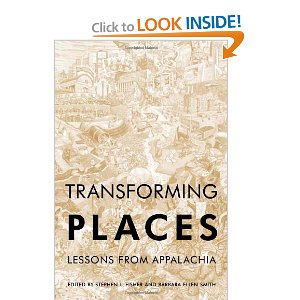
Book Description
In this era of globalization's ruthless deracination, place attachments have become increasingly salient in collective mobilizations across the spectrum of politics. Like place-based activists in other resource-rich yet impoverished regions across the globe, Appalachians are contesting economic injustice, environmental degradation, and the anti-democratic power of elites. This collection of seventeen original essays by scholars and activists from a variety of backgrounds explores this wide range of oppositional politics, querying its successes, limitations, and impacts. The editors' critical introduction and conclusion integrate theories of place and space with analyses of organizations and events discussed by contributors. Transforming Places illuminates widely relevant lessons about building coalitions and movements with sufficient strength to challenge corporate-driven globalization.
Review
“I cannot recall a book that has excited me more than Transforming Places. This work is a major step forward in the study of social change, our understanding of ‘free spaces,' and local resistance – how people get power and how they can use it to get more.” Richard A. Couto, editor of Political and Civic Leadership: A Reference Handbook “Transforming Places addresses timely issues and tracks changes in political movements in Appalachia, assessing the devastating economic, social, and environmental costs amid hints of optimism for a more sustainable future. This work is significant for Appalachian studies and its overlapping disciplines but also will be useful outside of academia for agencies and organizations focused on sustainable development, strengthening community, and building alliances.” Patricia D. Beaver, co-editor of Tales from Sacred Wind: Coming of Age in Appalachia “The range of topics covered in this volume provides an exciting view of the new directions grassroots activism is taking in Appalachia: immigrants' rights, the history and dissolution of an organizing training program, collaborations between faith-based institutions and labor, coalitions that address farming and hunger, and a variety of analyses of recent activism against mountaintop removal. This is undoubtedly a major contribution to Appalachian studies.” Mary K. Anglin, University of Kentucky
About the Author
Steve Fisher taught for 35 years at Emory & Henry College where he helped create an Appalachian Studies minor, the Appalachian Center for Community Service, and an interdisciplinary service-learning major. He was the 1999 Carnegie Foundation Outstanding Baccalaureate College Professor of the Year and has won a number of other teaching-related awards. He is the editor of Fighting Back in Appalachia: Traditions of Resistance and Change and co-editor of Transforming Places: Lessons from Appalachia, and has written extensively on a variety of Appalachian issues, including identity, resistance, and political economy, and on teaching and community-based education. He has been active in a number of Appalachian resistance efforts including the land study, Appalachian Alliance, and the Pittston strike and has worked to build links between the academic community and activists in the region. He was co-founder and columnist for The Plow, an alternative regional newspaper in the late 1970s. He recently served on the board of the Highlander Center, is an active member of the Appalachian Peace Education Center and the Virginia Organizing Project, and served on his county's Planning Commission from 2000-2012. He was the program chair of the first Appalachian Studies Conference, has served as President of the Appalachian Studies Association (ASA), and has received the ASA's Cratis Williams/James Brown Service Award. He currently hosts a weekly radio show (“Rise Up Singing”) on WEHC 90.7 FM.



